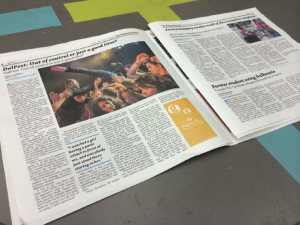
Writing in the early 1980s, author and media theorist Neil Postman started his book The Disappearance of Childhood saying, “Children are the living messages we send to a time we will not see.”
In Canada, in 2014, where nearly everything written and said ends up in a database to be analyzed at a later date, it’s reasonable to assume everything we do is a living message we send to a time we will not see.
In the late nineteenth century, the writers and editors of the Dalhousie College Gazette were not thinking about how their paper – subscriptions sold for a nickel at the janitor’s office – would end up converted into a series of 0s and 1s analyzed by machines on Dalhousie campus.
Yet as of this week, every issue of the Gazette’s 147-volume print run – excluding this volume and volume 146, which you may find at Dalgazette.com for now – is available for browsing on Dalhousie’s online institutional repository, DalSpace.
Maybe you already know this – it’s possible you’re reading this editorial digitally, the year 2014 has long since passed, and this editorial is dripping with irony.
If it’s true you’ve stumbled across this page via Dal’s digital archives, you may even find the ideas presented here appear in other editorials across the years.
Pick any two issues of the Gazette published since 1868, and you will find similarities.
Earlier this month, we published a story on Dalhousie’s new, stricter, hazing policies – a policy being applied to the men’s rugby team as this issue goes to print.
In 1967, our first issue of the year also had an article on a new hazing policy. The students’ council had decided orientation week should focus more on academics, so the hazing of freshmen was targeted.
Dennis Ashworth, Students’ Council president at the time, was reported as saying, “Hazing will be limited to groups of ten or more, and will take place on the campus.”
“This is definite policy, adopted by council last year, and will be rigidly enforced.”
The rigid enforcement of limiting hazing to large groups on campus may sound funny today for being so far removed from current social norms, but the hazing problem is addressed nearly every year.
This eternal recurrence of the same stories isn’t the result of a lack of imagination keeping our reporters forever following old topics – it’s simply a fact that issues like hazing and tuition are always legitimate areas of interest and concern to university life.
It will not be long until researchers, scholars and data analysts have tagged, made searchable and analyzed the archives of every newspaper, including this one. The trends of recorded history will be totally bared, and we will be forced to face their results.
For example – as editor-in-chief of the Gazette, I currently couldn’t tell you how many times an issue of this paper has been printed that was not what the editors intended to send to print. Once analysis is done on our archives, it might be easier to tell.
For now, I can only say that last week’s issue was not entirely what we intended to have printed.
Issue 147-04 of the Gazette was published with some erroneous pages. A miscommunication with our printer resulted in some pages from a draft version we sent over being printed after we sent off a revised edition and received confirmation this second version would indeed be printed.
In the print edition of issue 147-04, the headline for our story looking at the controversy of violence at DalFest 2014 – “Dal- Fest: Out of control or just a good time?” – shows up twice. The headline is duplicated in the subheadline – the sub-headline was removed in our editing process, it was not meant to remain as some kind of innovative tool for emphasis.
It’s also worth mentioning it was the women’s basketball team who supplied us with photos of the women’s basketball trip to Germany, not the women’s volleyball team.
The PDF of issue 147-04 we shared online this week reflects further changes that were made before printing, but did not reach publication. So when it comes time for issue 147-04 to be added to Dalspace, which issue will Dal’s archivists go with? They will have to decide which has more authority – the issue that was printed, or the digital issue we intended to have seen.
While our team of editors is more than satisfied with how it finally turned out, issue 147-04 of the Gazette was not Ulysses. Ninety years from now, scholars will not debate the merits of the revisions or authorial intentions of this issue – if this editorial was never written, maybe the errors with last week’s print issue would still never have bothered anyone and no future research efforts would be disrupted.
But the questions posed by deciding which version of last week’s issue should be determined as authoritative serve to remind us that as research and publishing methods evolve with technology, we must find new ways to question the intention and accuracy of documents left behind.

Recent Comments